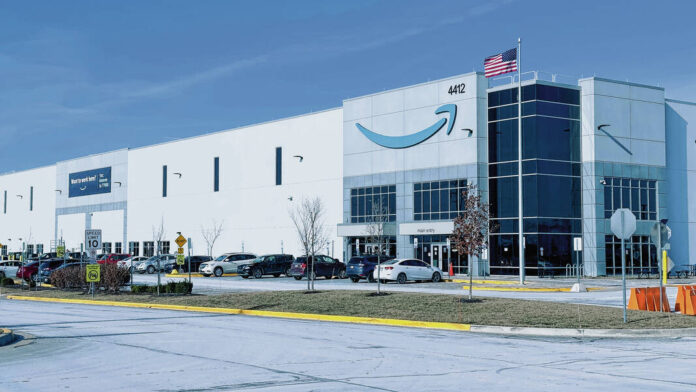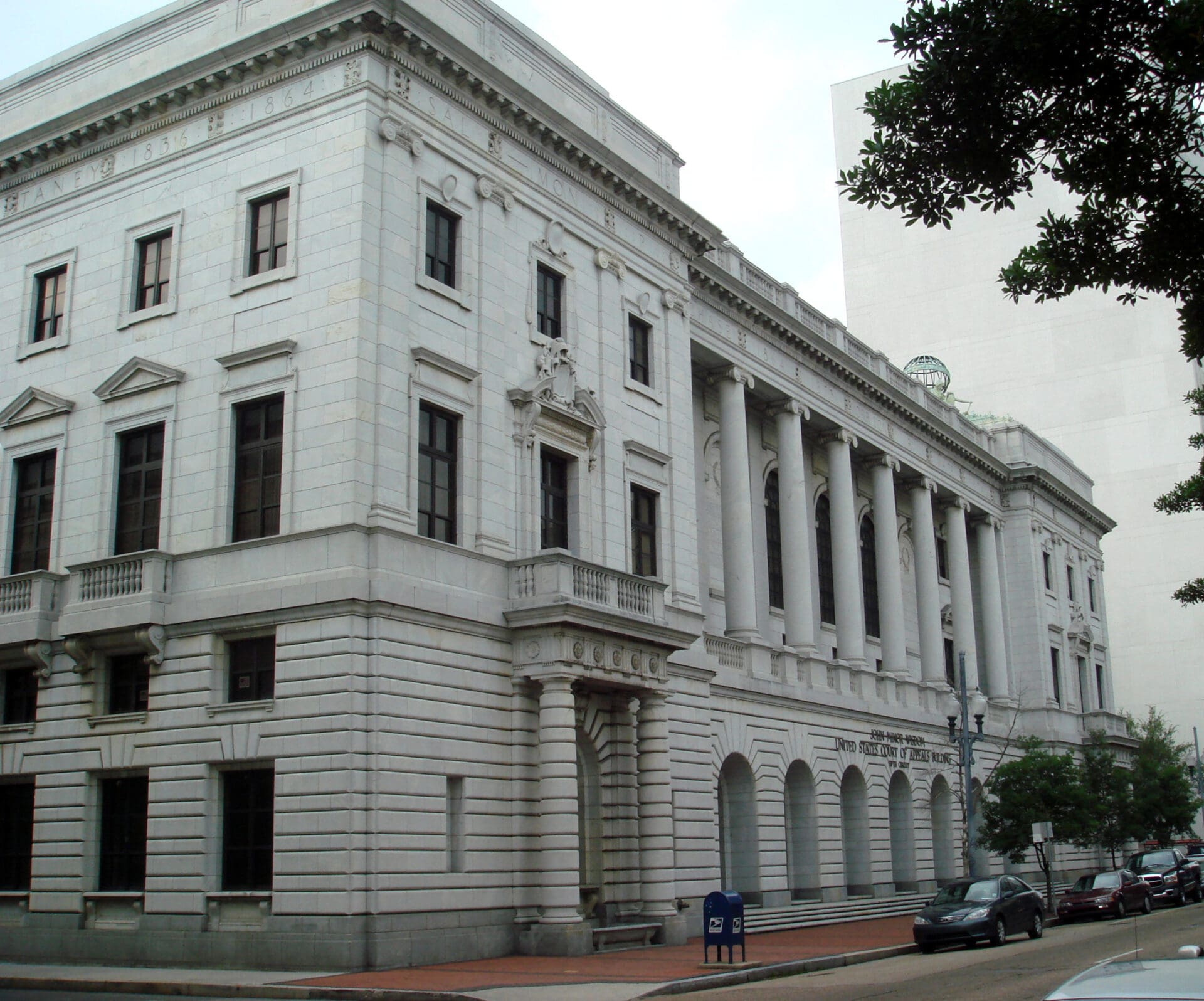Workplace violence is fairly common in today’s world, and often, innocent people are hurt or killed in such episodes. Sometimes, however, employees who are armed and trained in using their firearms can turn the tables in workplace violence situations.
Such was apparently the case at a Greenfield, Indiana, Amazon Distribution Warehouse on December 13 as the buys warehouse prepared Christmas orders. Police responded to a call of a shooting at the property in the early morning hours and arrived to find 39-year-old Isaac Riley dead of a gunshot wound.
According to a report in the Daily Reporter, some kind of a dispute occurred between Riley and the unidentified employee who shot him.
“We do know they were both employees who were getting to work, and there was some type of an interaction between them, we’re assuming a disagreement of some kind, but we are waiting for the detectives to finish up everything,” Police Capt. Robert Harris of the Hancock County Sheriff’s Office told the newspaper.
Prosecutor Brent Eaton told the Daily Reporter that the deceased and the shooter did not know each other but came into contact with each other just before the shooting. According to those reports, Riley confronted the shooter inside the Amazon facility and threatened to cause physical harm to him. Witnesses say the man attempted to de-escalate the situation and left the building.
He was waiting outside in the parking lot for a ride so he could leave the area when Riley again approached him and “made additional aggressive remarks and furtive movements while closing in on the shooter in an aggressive manner.” Witnesses said that’s when the man drew his concealed firearm and shot Riley.
Capt. Harris said that at this time, his agency is not recommending any charges be filed against the shooter. However, he said that could change following further investigation.
Prosecutor Brent Eaton, the person in charge of the final determination of whether charges are filed or not, reiterated Harris’ assertion that the shooting was self-defense.
“At this time, the evidence does not give us a crime that can be successfully prosecuted,” Eaton told the Daily Reporter.
Amazon spokesperson Austin Stowe told the newspaper that the plant had been closed after the shooting out of an abundance of caution.
“We are deeply saddened by this incident, and our thoughts are with their loved ones during this difficult time,” Stowe said in a press release. “We’re working closely with law enforcement while they investigate this incident.”





Sigh, one idiot dead and a person who will probably not have a job now. He may escape prosecution but I doubt he’ll escape the libs that run Amazon black listing him.
“Riley confronted the shooter inside the Amazon facility and threatened to cause physical harm to him.”
wrongly stated.
Riley confronted his intended victim inside the Amazon facility and threatened to cause physical harm to him.
You start out with a title proclaiming : “Amazon Warehouse Shooting Likely Self-Defense”, then go on to outline a self-defense situation.
If its self-defense, then the intended victim defended and should be identified as the intended victim and not ‘shooter’. Using ‘shooter’ in reference to the defending intended victim implies the defending intended victim is the same as the attacker in intent and that’s not the case in self-defense. Don’t play the anti-gun false-terminology game they use in wording to down play intended victim defenders for self-defense among many other deceptively broad terminology games they play.
Plus…
“Riley confronted the shooter inside the Amazon facility and threatened to cause physical harm to him.”
Is not correct in context. There was no ‘shooting’ at the time Riley confronted his intended victim inside the Amazon facility and threatened to cause physical harm to him – thus there was no ‘shooter’ at that context point, so Riley did not confront “the shooter” inside the Amazon facility but rather confronted his intended victim and threatened to cause physical harm to him.
The intended victim attempted to de-escalate the situation and left the building – no shooting happened in the building (i.e. Amazon facility) thus again there was no “the shooter inside the Amazon facility”.
He (the intended victim) was waiting outside in the parking lot for a ride so he could leave the area when Riley again approached him and made “additional aggressive remarks and furtive movements while closing in on the” (yeah, I know you quoted that from the police statements, but they should not being ‘shooter’ at this point either because at this point it became aggressor and intended victim and not aggressor and shooter). The intended victim drew his firearm and acted to defend and and shot Riley.
Article writers here need to stop referring to the defending victim as ‘shooter’.
No, he was the shooter in point of fact as he did shoot, but not a “perpetrator,” “suspect” or “attacker.”
No, he was the “victim” when inside the facility. He didn’t become the “shooter “ until later, in the parking lot.
In terms of pulling the trigger he did shoot but his actions was defense as the intended victim defender, not shooting as its just the means employed. Referring to the intended victim defender as only ‘shooter’ is re-framing context and ignoring the reason which was being the intended victim defender.
For example, this: “Riley confronted the shooter inside the Amazon facility and threatened to cause physical harm to him.”
That’s not true in context. There was no gun employed at that point , there was an intended victim who at that point employed the defense of (trying) “to de-escalate the situation” and then leaving the building. Do we say it this way then … “Riley confronted the de-escalater and leave’r inside the Amazon facility and threatened to cause physical harm to him.” – no of course not and neither is it correct to call the intended victim the ‘shooter’ there either. The bad guy has “threatened to cause physical harm to him” – he is the intended victim and no gun employed there so there could not have been any ‘shooter’ so why is the article referring to the intended victim at that point as the ‘shooter’?
Say for (another) example, the defender used a knife – do we say “Riley confronted the stabber inside the Amazon facility and threatened to cause physical harm to him.”
Say for (another) example, the defender used a fist – do we say “Riley confronted the fist’er inside the Amazon facility and threatened to cause physical harm to him.”
“Riley confronted the intended victim inside the Amazon facility and threatened to cause physical harm to him.”
Only when it comes to guns for defense do ‘journalists’ and police/politicians/prosecutors term the defending victim as the anti-gun preferred term of ‘shooter’ and that’s not what was happening but rather defense was happening and firing the gun was that defense.
So he did shoot in defense but his actions were as a victim defending, and not ‘shooting’ as his only action as implied by calling the victim ‘shooter’.
I just assume everyone is armed, and act accordingly.
My gut tells me there’s more to this. They work at the same place, but don’t know each other. Did the deceased choose the shooter at random? My experience says probably not. There’s likely some history somewhere. Nothing wrong with being armed at work as far as I’m concerned, but I find it unlikely that Amazon allows employees to be armed on the property. Regardless of how you feel about that, it is their property and the employees are taking Amazon’s coin. If that’s true then I would ask why the shooter felt it was risking his livelihood to carry a firearm at work contrary to corporate policies.
I’m thinking he carries at work/everywhere for the same reasons you and I do. F the corporate policy. You are right there is more story but we won’t ever hear it.
SO by your logic, you lose your 4A, 14A rights by being on private property?
FN, I don’t know. You tell me. Do you think that you have the right to say what others can do on your property? In your home? Even if that activity otherwise legal/protected? By your reasoning I have to let the Jehovah Witness into my home and listen to them. Freedom of speech and religion, you understand.
Amazon’s legal recourse if you carry on their property after being told not to is to ask you to leave, or to fire you if you’re an employee- which I assume they will exercise on the guy that just shot someone and self-defense in their parking lot.
You seem to be saying that if you are aware that a business doesn’t want you carrying, you have some moral duty to comply. I disagree.
I would be willing to entertain your argument if Amazon also felt a reciprocal duty to ensure your safety while on their property if they have a no weapons policy.
Had the shooter in this case been unarmed and ended up injured or killed as a result, Amazon would vigorously defend itself in court, arguing that despite having a no weapons policy on its campus that creates no obligation to ensure your safety while you’re there.
If that’s true then I would ask why the shooter felt it was risking his livelihood to carry a firearm at work contrary to corporate policies.
My personal opinion is that I can always find another job or create my own. Another mortal existence, OTOH, is a bit harder to come by.
I’d agree that at a glance it seems to be less than even odds that they didn’t know each other at least in passing. But then Amazon plants are huge in some cases and there’s always chances for random events involving drugs, mental illness, ‘roids, mistaken identity, misheard words mixed with a volatile temper etc.
As I’ve said before, I’ve met and talked to mentally ill people who explained their situation and my reaction was “Wow, I’m glad this person decided to start shooting heroin instead of attacking random people on the street because the hallucinations told them to”.
Before that, if you’d told me that I’d be thankful that someone decided to become a junkie instead of doing something else, I’d probably have laughed at you.
People letting their ego drive their interactions with other people often works out in a suboptimal manner.
It would seem that certain portions of blue collar work hasn’t changed much since I was doing it. It wasn’t the work that I found unpleasant it was the people.
When you realize that your coworkers are all thieves, drug addicts, raging alcoholics, emotional basket cases and mostly not very nice to boot, you kinda start to think you should have joined a gang for a better class of co-worker.
At least that way, when you drop some guy there’s no paperwork and you get to take his wallet, jewelry and, if they’re nice, shoes.
No kidding. Working in warehouses/factories is the reason I started carry at work.
When coworkers get mad at you for not helping them lie on their timeaheet or making them do some work and then want to get in your face and fight you, it’s time to start packing heat.